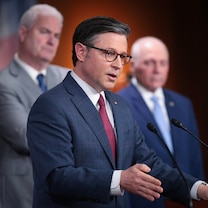Diwali Festival: 900 Million People, One Party
Hindus unite for one of the worlds oldest, loudest holidays.
NEW DELHI, Nov. 9, 2007— -- If you didn't know any better, you'd think you were surrounded by gunfire. Explosions on the street, on the roof, on the house behind yours. Rat-tat-tat-tat on the tin that covers the neighbor's patio.
Thunderous sounds and a seemingly endless fury of booms and bangs and whistles and detonations fill the neighborhood, and light fills the sky. Red and green and white light.
The explosions, of course, are not bombs, and the lights are not produced by weapons. They are thousands of cheap fireworks set off by hand, in the front yards and on the streets of every neighborhood of New Delhi, the capital of India, in honor of one of the most famous Hindu holidays.
It's July Fourth, Indian style. It's called Diwali, and 900 million people here and around the world are celebrating.
The Diwali festival's origins can be traced to the return of a king from a long banishment. The word itself is a shortened version of the two Sanskrit words that mean "rows of light."
And the festival of light, as it is commonly known now, is celebrated by blowing up as many firecrackers as a person is capable of in one night.
Little firecrackers that make short, loud booms. Circular fireworks that look like snakes chasing their tails and spitting light out of their mouths. Triangular fireworks that create a 6-foot-tall streams of green and white. Fireworks that look like a row of cigarettes attached at the filters and sound like automatic weapons.
Across the street from us, a 15-year-old hammed it up for my camera as he lit not one, not two, but three sets of obnoxious little guys that pop your eardrum and fly in every direction. With a smile he showed me his arm -- which was covered with burn marks. He didn't seem to mind. The next time, he lit four at once.
Despite its Hindu roots, Diwali (pronounced Di-vall-ee) is a national holiday for all Indians, regardless of religion. Hindus, Muslims and Sikhs celebrate by lighting candles and setting off fireworks, or "bombs," as many call them (a nod to their tendency to make noise but emit no light).
The day is also meant to make people thankful. "You feel that your life is so important. It just makes you realize that the healthy life that you have is such a precious gift," Shoaib Akhtar, one of the stars of Pakistan's beloved cricket team, told the television network IBN today
But Diwali is also a day of prayers for prosperity and toasts to the coming year. And people are expected to give presents to their friends and family and workers. Maids will ask their bosses for a "diwali gift," and landlords will give their new tenants anything from sweets to cake to new cookware.




